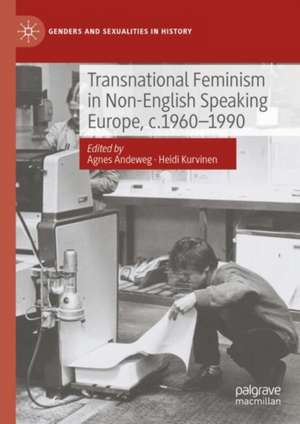Transnational Feminism in Non-English Speaking Europe, c.1960-1990: Genders and Sexualities in History
Editat de Heidi Kurvinen, Agnes Andewegen Limba Engleză Hardback – 10 ian 2025
Din seria Genders and Sexualities in History
-
 Preț: 282.38 lei
Preț: 282.38 lei - 9%
 Preț: 695.09 lei
Preț: 695.09 lei - 18%
 Preț: 629.18 lei
Preț: 629.18 lei - 20%
 Preț: 693.38 lei
Preț: 693.38 lei -
 Preț: 390.63 lei
Preț: 390.63 lei -
 Preț: 389.70 lei
Preț: 389.70 lei -
 Preț: 394.51 lei
Preț: 394.51 lei - 15%
 Preț: 589.33 lei
Preț: 589.33 lei - 15%
 Preț: 641.71 lei
Preț: 641.71 lei -
 Preț: 389.11 lei
Preț: 389.11 lei - 15%
 Preț: 646.62 lei
Preț: 646.62 lei - 15%
 Preț: 645.47 lei
Preț: 645.47 lei -
 Preț: 389.70 lei
Preț: 389.70 lei -
 Preț: 385.84 lei
Preț: 385.84 lei - 18%
 Preț: 791.09 lei
Preț: 791.09 lei - 15%
 Preț: 701.90 lei
Preț: 701.90 lei -
 Preț: 391.61 lei
Preț: 391.61 lei - 15%
 Preț: 697.32 lei
Preț: 697.32 lei - 15%
 Preț: 643.34 lei
Preț: 643.34 lei -
 Preț: 388.72 lei
Preț: 388.72 lei -
 Preț: 238.73 lei
Preț: 238.73 lei -
 Preț: 390.63 lei
Preț: 390.63 lei - 15%
 Preț: 644.95 lei
Preț: 644.95 lei - 15%
 Preț: 698.15 lei
Preț: 698.15 lei -
 Preț: 391.61 lei
Preț: 391.61 lei -
 Preț: 418.07 lei
Preț: 418.07 lei - 15%
 Preț: 585.26 lei
Preț: 585.26 lei -
 Preț: 395.47 lei
Preț: 395.47 lei -
 Preț: 387.38 lei
Preț: 387.38 lei - 15%
 Preț: 646.62 lei
Preț: 646.62 lei - 18%
 Preț: 826.41 lei
Preț: 826.41 lei - 15%
 Preț: 697.15 lei
Preț: 697.15 lei -
 Preț: 416.16 lei
Preț: 416.16 lei - 15%
 Preț: 643.34 lei
Preț: 643.34 lei -
 Preț: 390.63 lei
Preț: 390.63 lei - 18%
 Preț: 835.73 lei
Preț: 835.73 lei
Preț: 782.57 lei
Preț vechi: 954.35 lei
-18% Nou
Puncte Express: 1174
Preț estimativ în valută:
149.74€ • 156.76$ • 123.90£
149.74€ • 156.76$ • 123.90£
Carte disponibilă
Livrare economică 17-31 martie
Preluare comenzi: 021 569.72.76
Specificații
ISBN-13: 9783031691379
ISBN-10: 3031691377
Pagini: 240
Ilustrații: Approx. 240 p. 12 illus. in color.
Dimensiuni: 148 x 210 mm
Greutate: 0.46 kg
Ediția:2025
Editura: Springer Nature Switzerland
Colecția Palgrave Macmillan
Seria Genders and Sexualities in History
Locul publicării:Cham, Switzerland
ISBN-10: 3031691377
Pagini: 240
Ilustrații: Approx. 240 p. 12 illus. in color.
Dimensiuni: 148 x 210 mm
Greutate: 0.46 kg
Ediția:2025
Editura: Springer Nature Switzerland
Colecția Palgrave Macmillan
Seria Genders and Sexualities in History
Locul publicării:Cham, Switzerland
Cuprins
1: Introduction.- 2: Recording now: Writing lesbian-feminist history in Dutch LGBT magazines.- 3: Nordic connections: The inspiration for the transition of feminist activism in the 1980s.- 4: Dutch women in print from an international perspective.- 5: Portrayal of Soviet women in the negotiations of gender equality and feminism in the Finnish print media of the 1960s and 1970s.- 6: Independents, institutionalists, and the international feminist fight in late twentieth-century Spain and Europe.- 7: Metoo and cross-Nordic influences: The case of the metoo-action #dammenbrister.- 8: 'The ideology developed extempore': Ideas, activities, and influences of the Redstocking movement in Iceland, 1970-1982.- 9: Intermediaries of the revolution: The roleof journalists in the transnational circulation of feminism in France, 1968-1979.- 10: For the decriminalization of abortion and for a feminist gynecology: Practices, transnational and translocal networks in the Italian women’s health movement (1970’s).- 11: The Association 9 and the debate of sex roles in Finland in the 1960s.- 12: Transnational histories of Italian feminism: Consciousness raising, reproductive work and the reinvention of leftist internationalism (1960s-1980s).- 13: Reading and writing the Nordic new women’s movements.
Notă biografică
Heidi Kurvinen is Collegium Researcher in the Turku Institute for Advanced Studies at the University of Turku, Finland.
Agnes Andeweg is Associate Professor in Modern Literature at University College Utrecht, the Netherlands.
Agnes Andeweg is Associate Professor in Modern Literature at University College Utrecht, the Netherlands.
Textul de pe ultima copertă
This edited collection aims to look beyond established narratives of feminist history, by focusing on non-English speaking European countries. Recent scholarship on the history of the women’s liberation movement in individual countries has enhanced our understanding of the importance of transnational influences in the history of European feminism, and problematised the periodisation of feminisms. Additionally, translation of feminist practices and texts have received interest during the past years. Despite this work, the United States, and to a lesser extent the United Kingdom, are still main points of reference in histories of post-war feminism. This book asks what happens to the picture if we place non-English speaking European countries into the centre. Using Lucy Delap’s concept of ‘mosaic feminism’, its contributors emphasise the variety of patterns that women’s feminist organising showed in different cultural contexts despite similarities in their ideological corner stones.
Heidi Kurvinen is Collegium Researcher in the Turku Institute for Advanced Studies at the University of Turku, Finland.
Agnes Andeweg is Assistant Professor at University College Utrecht, the Netherlands.
Heidi Kurvinen is Collegium Researcher in the Turku Institute for Advanced Studies at the University of Turku, Finland.
Agnes Andeweg is Assistant Professor at University College Utrecht, the Netherlands.
Caracteristici
Aims to look beyond established narratives of feminist history, by focusing on non-English speaking European countries Asks what happens to the picture if we place non-English speaking European countries into the centre Emphasize the variety of patterns that women’s feminist organizing showed in different cultural contexts
